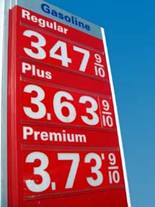With the average price of a gallon of gasoline over $3.601 and diesel well over $4.002, it’s no surprise that political solutions to the high price of fuel have started to surface. One proposal, introduced by Sens. John McCain (R-AZ) and supported by Hillary Rodham Clinton (D-NY), is to institute a gas tax holiday between Memorial Day in late May and Labor Day in early September, during which time the Treasury would not collect the 18.4-cent federal tax on gasoline and 24.4-cent federal tax on diesel fuel.

- The tax break goes to fuel producers and retailers, who actually pay the gas tax to the Treasury. The tax is passed on to the consumer in the form of higher prices.
- As a result, there is no guarantee that taxpayers will see any relief at the pump, since the fuel producers wouldn’t be required to pass along their tax savings to consumers. Requiring gas stations to pass along the savings, as Sen. Clinton has proposed, would be cumbersome and expensive. And even if that was a realistic scenario, it won’t mean an 18.4-cent drop in the price of gas. Jeffrey Perloff, an economist at University of California-Berkeley, estimates that the price-drop will be as little as 9-cents per gallon3.
- At a savings of 9-cents per gallon, assuming you drive 4,000 miles this summer and your car gets 20 miles per gallon, the gas tax holiday will save you a whopping $18.
- Despite the limited benefit at the pump, the biggest hit for taxpayers would be the impact on the nation’s transportation program. The Highway Trust Fund is going broke, and a gas tax holiday may only speed up its downfall. The trust fund is the account where our federal gas tax dollars are collected, to be used exclusively to fund transportation improvements and projects. The transportation bill Congress passed in 2005 will leave the trust fund more than $3 billion in the red by the end of 2009. The gas tax holiday will further reduce trust fund revenues by more than $9 billion4. This will mean either backfilling the trust fund from general funds and driving up the deficit or spending less money to fix up our roads and bridges. Neither option is viable.
- The gas tax holiday may be a political expedient solution to taxpayers’ pain at the pump, but the minor cost savings will be more than offset by the significant damage inflicted upon the nation’s transportation program.
1. Energy Information Administration, “Weekly U.S. Retail Gasoline Prices, Regular Grade”, April 28, 2008, http://www.eia.doe.gov/oil_gas/petroleum/data_publications/wrgp/mogas_home_page.html
2. Energy Information Administration , “Weekly Retail On-Highway Diesel Prices”, April 28, 2008, http://tonto.eia.doe.gov/oog/info/wohdp/diesel.asp
3. “Fact Checker: A holiday from gas prices”, The Washington Post, http://blog.washingtonpost.com/fact-checker/2008/04/a_holiday_from_gas_prices.html
4. This is a conservative estimate, since it is derived from data that includes the June through August period, but the holiday would also include Memorial Day and Labor Day, the two biggest driving weekends of the summer. For the back ground data on this see the Treasury reports of Highway Trust Fund receipts from June, July, and August of 2007.














Get Social